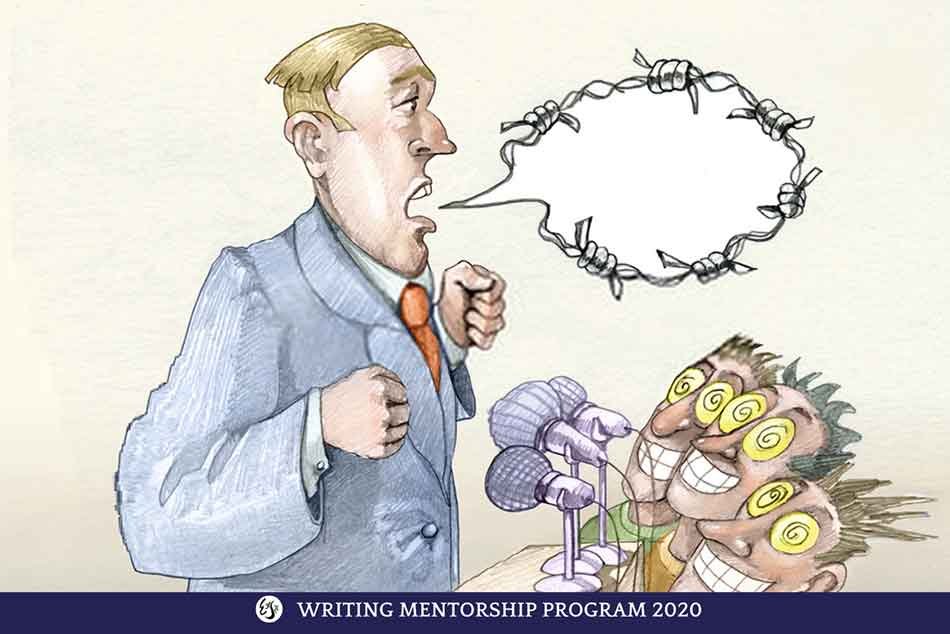
Published in:
Global
Wave of Far Right Populism

How have we reached such unprecedented levels of polarization in Europe and the Americas, traditional bulwarks of democratic values.
Across the world, populism is growing on both the left and the right, but it has much more momentum on the right. The rise of these far-right populist movements has never been more prominent than ever in Europe, the United States, and Brazil. These nations have traditionally been bulwarks of true democratic values and it has been most astonishing that these populist movements have gained a lot of traction and influence in the political discourse of these nations and have fundamentally altered the traditional outlook on political movements and democracy. In this article, I shall endeavour to analyse the rise of far-right movements in Europe and the United States of America and link it to the future of populism.
Recent developments in Europe, starting with the economic crisis and followed by the refugee crisis, seem to have created favourable conditions for a remarkable mobilization of radical right organizations and movements illustrated not only by the victory of Trump at the US presidential election, Brexit (which was supported by right-wing groups and politicians) and the emergence of new nationalist movements such as the ‘alt-right’ and Pegida, but also by the rising electoral success and social penetration of radical right groups all across Europe . The recent 2019 European Parliament elections, although with mixed outcomes for the radical right (performing strikingly well in some big countries such as Italy, Poland and Hungary), were no exception: with, overall, the number of radical right MEPs increasing significantly. This process can be observed in both Western and Central/Eastern Europe (and beyond), and both inside and outside the electoral arena. To mention just a few examples: the ‘Sweden Democrats’ (with 18% of votes in the September 2018 elections); the ‘Czech Trump’ of the party of ‘Unsatisfied Citizens’ (with 30% of the vote in 2018); ‘Alternative for Germany’ (AfD) entering the German Bundestag (with almost 13% of the vote in the 2017 federal and 2018 regional elections); the success of the Danish People’s Party (21% in 2015); and the Slovak Kotleba-People’s Party (8% in 2016). Along with the growing importance of right-wing parties, new forms of right-wing social movements have emerged that function as incubators of new political and organizational ideas. The rise of the anti-Islamic Pegida movement since 2014, with its weekly marches of anti-immigrant vigilante groups and citizen street patrols (e.g. the Soldiers of Odin), and the swift spread of the Identitarian movement, are just some of the latest sustained episodes of radical right mobilization outside the electoral arena.
In Europe, such movements have taken hold primarily due to the integration of the European nations in the European Union. They have espoused greater opposition to the globalisation and international cooperation within the EU and promote “independence from the European Union” and have been campaigning for withdrawal from the EU. Emboldened by the Brexit referendum, these far-right movements have renewed their effort to dissolve the European Union, using reasons like pro-immigration stances of the European Union (referring to the effort undertaken by the EU to protect Greece and Italy from suffering from the brunt of the refugee crisis) and its financial and judicial influence from the European Central Bank and the EU Court of Justice. For all their nationalised anti-globalisation, they really are globalised nationalists!
Since 2010, with the rise of the tea-party movement in the United States of America, the partisan divide in the United States has more than doubled , leading to unprecedented levels of political polarization and an increasingly hateful and distrustful view of differing political views. This was accentuated by the election of President Barack Obama, who aroused the raw racist emotions of those in the right and culminated in one of the great tragedies of the decade. In 2017, Neo-Nazis and KKK members descended upon the streets with torches, swastikas and chants like “Jews will not replace us” and “Blacks will not replace us”. Violence ensued when counter-protestors and protestors clashed and a woman was run over by a Neo-Nazi. The election of Donald Trump has given impetus to such groups in the White House, who echoes many of the baseless conspiracy theories that these groups live off of (a prominent example being the George Soros linked theories). Right-wing extremism and domestic terrorism by far-right groups in the United States appears to be growing. “The number of terrorist attacks by far-right perpetrators rose over the past decade, more than quadrupling between 2016 and 2017. The recent pipe bombs sent to Democratic politicians and the October 27, 2018, synagogue attack in Pittsburgh are symptomatic of this trend.”-Seth G. Jones (Centre for Strategic & International Studies) Right-wing extremists generally criticize the democratic state for “its liberal social welfare policies and tolerance of diverse opinion—alongside its permitting of dark-skinned immigrants in the national labour force and of Jews and other minorities in positions of power or influence . Right-wing movements have always gained traction at times when levels of immigration increase and economic troubles plague the economy. The false view comes into place that immigrants are taking away good-paying jobs and are thus the reason for economic woes.
The role of ‘ideology’ is in fact considered crucial in rightwing movements to allow activists to justify even violent actions within a broader system of values (although deviant). Scholars have, for example, analyzed the Tea Party as a conservative (mostly) white, older, male and middle-class social movement in which a racist agenda is, unlike in the US radical right, largely implicit, yet which holds at its core a celebration of hardworking citizens based on racist constructions; in this movement, racist ideologies crucially intertwine with economic and social concerns.
We can understand these movements through their core attributes of “anti-constitutionalism”, “anti-democratic values”, and a rejection of the principle of fundamental human equality. These movements are widely recognized as being characterized by some common core ideological attributes: such as nationalism, exclusionism, xenophobia, the quest for a strong state, welfare chauvinism, revisionism and traditional ethics .
High levels of political polarization are really harmful to democracy because it prevents compromise and legislation which creates meaningful progress. The “Overton window” in politics has been stretched so far to the left and the right that political tensions have reached a boiling point. Levels of domestic terrorism have reached historic highs and the world seems on the brink of political, economic, and social breakdown. The pandemic has further widened the gap with a huge divide appearing over reopening the nations with far-right movements mobilizing with AR-15s and storming State Capitols to get their agenda passed. This is not normal! Something so infuriating as this should never become the norm. The world needs politicians who will reach across the aisle, respect the views of the opposition, work with them instead of filibustering them, and actually get work done!
By Raunakk Jalan
Senior Secondary Student, Don Bosco School, Park Circus, Kolkata, West Bengal
References:
Caiani, Manuela. (2019). The rise and endurance of radical right movements. Current Sociology. 67. 001139211986800. 10.1177/0011392119868000.
2 https://www.people-press.org/2017/10/05/the-partisan-divide-on-political-values-grows-even-wider/ (See 2011)
3 https://www.nbcnews.com/news/us-news/neo-nazis-u-s-europe-build-far-right-links-concerts-n1165266
4 https://www.csis.org/analysis/rise-far-right-extremism-united-states
5 https://www.nytimes.com/2019/08/10/world/europe/sweden-immigration-nationalism.html
6 https://scholar.harvard.edu/files/williamson/files/tea_party_pop_0.pdf
7 Caiani, Manuela. (2019). The rise and endurance of radical right movements. Current Sociology. 67. 001139211986800. 10.1177/0011392119868000.
Across the world, populism is growing on both the left and the right, but it has much more momentum on the right. The rise of these far-right populist movements has never been more prominent than ever in Europe, the United States, and Brazil. These nations have traditionally been bulwarks of true democratic values and it has been most astonishing that these populist movements have gained a lot of traction and influence in the political discourse of these nations and have fundamentally altered the traditional outlook on political movements and democracy. In this article, I shall endeavour to analyse the rise of far-right movements in Europe and the United States of America and link it to the future of populism.
Recent developments in Europe, starting with the economic crisis and followed by the refugee crisis, seem to have created favourable conditions for a remarkable mobilization of radical right organizations and movements illustrated not only by the victory of Trump at the US presidential election, Brexit (which was supported by right-wing groups and politicians) and the emergence of new nationalist movements such as the ‘alt-right’ and Pegida, but also by the rising electoral success and social penetration of radical right groups all across Europe . The recent 2019 European Parliament elections, although with mixed outcomes for the radical right (performing strikingly well in some big countries such as Italy, Poland and Hungary), were no exception: with, overall, the number of radical right MEPs increasing significantly. This process can be observed in both Western and Central/Eastern Europe (and beyond), and both inside and outside the electoral arena. To mention just a few examples: the ‘Sweden Democrats’ (with 18% of votes in the September 2018 elections); the ‘Czech Trump’ of the party of ‘Unsatisfied Citizens’ (with 30% of the vote in 2018); ‘Alternative for Germany’ (AfD) entering the German Bundestag (with almost 13% of the vote in the 2017 federal and 2018 regional elections); the success of the Danish People’s Party (21% in 2015); and the Slovak Kotleba-People’s Party (8% in 2016). Along with the growing importance of right-wing parties, new forms of right-wing social movements have emerged that function as incubators of new political and organizational ideas. The rise of the anti-Islamic Pegida movement since 2014, with its weekly marches of anti-immigrant vigilante groups and citizen street patrols (e.g. the Soldiers of Odin), and the swift spread of the Identitarian movement, are just some of the latest sustained episodes of radical right mobilization outside the electoral arena.
In Europe, such movements have taken hold primarily due to the integration of the European nations in the European Union. They have espoused greater opposition to the globalisation and international cooperation within the EU and promote “independence from the European Union” and have been campaigning for withdrawal from the EU. Emboldened by the Brexit referendum, these far-right movements have renewed their effort to dissolve the European Union, using reasons like pro-immigration stances of the European Union (referring to the effort undertaken by the EU to protect Greece and Italy from suffering from the brunt of the refugee crisis) and its financial and judicial influence from the European Central Bank and the EU Court of Justice. For all their nationalised anti-globalisation, they really are globalised nationalists!
Since 2010, with the rise of the tea-party movement in the United States of America, the partisan divide in the United States has more than doubled , leading to unprecedented levels of political polarization and an increasingly hateful and distrustful view of differing political views. This was accentuated by the election of President Barack Obama, who aroused the raw racist emotions of those in the right and culminated in one of the great tragedies of the decade. In 2017, Neo-Nazis and KKK members descended upon the streets with torches, swastikas and chants like “Jews will not replace us” and “Blacks will not replace us”. Violence ensued when counter-protestors and protestors clashed and a woman was run over by a Neo-Nazi. The election of Donald Trump has given impetus to such groups in the White House, who echoes many of the baseless conspiracy theories that these groups live off of (a prominent example being the George Soros linked theories). Right-wing extremism and domestic terrorism by far-right groups in the United States appears to be growing. “The number of terrorist attacks by far-right perpetrators rose over the past decade, more than quadrupling between 2016 and 2017. The recent pipe bombs sent to Democratic politicians and the October 27, 2018, synagogue attack in Pittsburgh are symptomatic of this trend.”-Seth G. Jones (Centre for Strategic & International Studies) Right-wing extremists generally criticize the democratic state for “its liberal social welfare policies and tolerance of diverse opinion—alongside its permitting of dark-skinned immigrants in the national labour force and of Jews and other minorities in positions of power or influence . Right-wing movements have always gained traction at times when levels of immigration increase and economic troubles plague the economy. The false view comes into place that immigrants are taking away good-paying jobs and are thus the reason for economic woes.
The role of ‘ideology’ is in fact considered crucial in rightwing movements to allow activists to justify even violent actions within a broader system of values (although deviant). Scholars have, for example, analyzed the Tea Party as a conservative (mostly) white, older, male and middle-class social movement in which a racist agenda is, unlike in the US radical right, largely implicit, yet which holds at its core a celebration of hardworking citizens based on racist constructions; in this movement, racist ideologies crucially intertwine with economic and social concerns.
We can understand these movements through their core attributes of “anti-constitutionalism”, “anti-democratic values”, and a rejection of the principle of fundamental human equality. These movements are widely recognized as being characterized by some common core ideological attributes: such as nationalism, exclusionism, xenophobia, the quest for a strong state, welfare chauvinism, revisionism and traditional ethics .
High levels of political polarization are really harmful to democracy because it prevents compromise and legislation which creates meaningful progress. The “Overton window” in politics has been stretched so far to the left and the right that political tensions have reached a boiling point. Levels of domestic terrorism have reached historic highs and the world seems on the brink of political, economic, and social breakdown. The pandemic has further widened the gap with a huge divide appearing over reopening the nations with far-right movements mobilizing with AR-15s and storming State Capitols to get their agenda passed. This is not normal! Something so infuriating as this should never become the norm. The world needs politicians who will reach across the aisle, respect the views of the opposition, work with them instead of filibustering them, and actually get work done!
By Raunakk Jalan
Senior Secondary Student, Don Bosco School, Park Circus, Kolkata, West Bengal
References:
Caiani, Manuela. (2019). The rise and endurance of radical right movements. Current Sociology. 67. 001139211986800. 10.1177/0011392119868000.
2 https://www.people-press.org/2017/10/05/the-partisan-divide-on-political-values-grows-even-wider/ (See 2011)
3 https://www.nbcnews.com/news/us-news/neo-nazis-u-s-europe-build-far-right-links-concerts-n1165266
4 https://www.csis.org/analysis/rise-far-right-extremism-united-states
5 https://www.nytimes.com/2019/08/10/world/europe/sweden-immigration-nationalism.html
6 https://scholar.harvard.edu/files/williamson/files/tea_party_pop_0.pdf
7 Caiani, Manuela. (2019). The rise and endurance of radical right movements. Current Sociology. 67. 001139211986800. 10.1177/0011392119868000.


